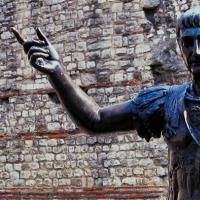Caliph Ali (656-661)
After the assassination of Osman and the election of Ali as caliph (656), power finally passed into the hands of the closest relative of the prophet, who, in the opinion of one of the strongest Muslim parties, due to this kinship and his high personal talents, had more than all other rights to the caliphate after death in 632 of Muhammad himself. The adherents of this party Shiites), still recognize the fourth caliph Ali as the first legitimate successor of Muhammad, while the other part of the Muslims ( Sunnis ) recognizes three of his predecessors as legitimate caliphs. However, Ali could not calmly use his power. Enemies accused him of killing Osman, and it is not surprising that, despite all the efforts of Muhammad, the attachment to his relatives and the custom of blood feud, preserved among the Arabs, Osman's cousin, Muawiyah, managed in a short time to make a strong party against the new caliph.
Caliph Ali. Artist A. Hovnatanyan, 19th century
Ali was first advised to avert the imminent danger, leaving in place all the governors of Osman, who, illegally using power, were the main culprits of the uprising; but he was too hot-tempered, too hated any pretense, to resort to such a measure, and by removing the governors from office, he hardened them against him. Muawiya used all the means in his power to overthrow the hated Ali; it was not difficult for him to start a war with the new caliph, because the Syrian troops were unconditionally loyal to their leader and had no confidence in Ali, who relied only on himself and on God. In his speeches to the army, Mu'awiya used Osman's bloody clothes, in the same way and with the same success as Antony once did with Caesar's toga. Aisha, the widow of Muhammad and the daughter of the first caliph Abu Bakr, who enjoyed great influence among the faithful, also declared herself against Ali, with whom she was at enmity. Even Talha And Zubair, the most respected of the Muslims and who themselves wanted to become caliphs, fell away from Ali, although at first, out of necessity, they recognized him. On the side of the new caliph were all those who recognized Muhammad only as a prophet, and not as the founder of a secular state.
Ali moved to Iraq, where Talha, Zubair and Aisha left. He met them not far from Basra, near the insignificant town of Hureyba, where a bloody battle took place, called " camel battle”, because Aisha, “the mother of the believers”, rode in front of the ranks of warriors on a camel to inspire her defenders (656). After a bloody battle, in which, according to the most moderate testimony of historians, up to ten thousand Muslims fell, Ali won. Talha and Zubair were killed and Aisha was taken prisoner. The noble Ali treated her with respect and great indulgence, despite the fact that she was his implacable enemy. By his order, her brother, an adherent of the caliph, sent her to Basra, and from there, accompanied by slaves and in a man's dress, to Medina. Even before the battle and during the battle itself, Caliph Ali forbade his army to shed the blood of opponents without need, and after the victory he pardoned many of his worst enemies taken prisoner by him.
After this victory, Ali became the complete ruler of Iraq, Arabia and Egypt, where his governor, Qais, gradually forced almost everyone to recognize him as caliph. But Ali still had to defeat Muawiyah, who, having a good army and constant income, and gaining in the person of the one who went over to his side Amr ibn al-As(the conqueror of Egypt) an experienced adviser and commander, was the most dangerous opponent of the caliph. Muawiya marched against Caliph Ali with 80,000 troops. Enemies, almost equal in number, meeting on the Euphrates at Siffina(near Rakki), stood against each other for several months, avoiding a decisive battle (657). During this time there were so many small skirmishes that, little by little, Ali's army was left, as they say, only twenty-five thousand people, and the opponents up to forty-five thousand.
Saddened by the death of so many faithful, Caliph Ali offered his opponent to solve the matter by single combat, but Muawiyah did not accept his challenge. Finally, the preponderance began to visibly tilt towards Ali, and Muawiya, not hoping for a successful outcome of the war, resorted to cunning and deceit. He invited his opponent to decide by arbitration which of them, on the basis of the instructions of the Koran, should be the caliph. Ali well understood that this was only a ruse devised in order to avoid solving the dispute with weapons, which, in all likelihood, would have ended in his favor, and with the aim of sowing discord in his army. But part of the caliph's army, which Muawiyah had placed in his favor with various promises, forced Ali to agree to this proposal. These same traitors arranged the matter in such a way that on the part of Ali's army, a man was appointed judge who himself took a secret part in the conspiracy or who was easy to outwit; the opposite side chose the cunning Amr. In the Caliph's army, many were extremely dissatisfied with this choice and in general with all the negotiations. Thus, Muawiya achieved his goal and there was discord between the adherents of Ali.
The judges decided that neither of the rivals should be caliph, and Abu Musa, chosen by Ali, solemnly announced to both troops that he was deposing Ali as caliph. Instead of announcing the same about Muawiyah, Amr said to his warriors: “You heard that even the judge chosen by Ali deprived him of the caliphate. I also deprive him, and at the same time I proclaim the ruler of Muawiya, as the only legitimate successor of the prophet. Ali did not recognize this decision and decided to avenge the deceit with weapons; but part of his army separated from him. Amr, to whom Muawiya ceded Egypt as a reward for his service, providing some independence in government, immediately expelled Ali's governor from there, and soon Muawiya himself gained the upper hand in Iraq and Arabia.
There was a crowd of fanatics in Ali's army, in the eyes of which any arbitration court seemed to be a measure contrary to religion, because according to their concepts, all doubts had to be resolved on the basis of the Koran. These fanatics, called Kharijites, ("apostates", "breakaways"), broke away from Ali and declared both him and Muawiya disbelievers. Ali defeated them in the battle of Nakhravan(658), but could not resist the fight against Muawiyah. Finally, the three Kharijites decided to forcibly end this internecine war and, in order to destroy the very cause of disagreements and interregnums, swore to each other to kill at the same hour in three different cities the three perpetrators of evil: Ali, Muawiyah and Amr. One of the conspirators, Burak, undertook to kill Muawiya, another, Abdarrahman, originally from Egypt, Ali, the third, Amr, the son of Bakr, volunteered to kill the Egyptian governor Amr. Buraq only wounded Mu'awiya; Amr escaped death because the killer mistakenly killed another instead of him; Abdarrahman managed to hit Ali with a dagger at the moment when he entered the mosque. Ali died two days later (661). His first wife, Fatima, daughter of the Prophet Muhammad, died long before him.

Mosque in Najaf (Iraq) - the burial place of Caliph Ali
The only lineage of the Prophet's descendants went through Caliph Ali and Fatima. The clan of Muhammad, which still exists in the Islamic world, is therefore called the Alids or Fatimids.


